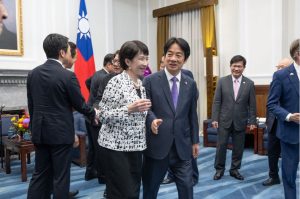As the newly elected president of Japan’s Liberal Democratic Party (LDP), arch-conservative Takaichi Sanae is poised to be Japan’s first female prime minister. Takaichi has positioned herself as the true successor to former Prime Minister Abe Shinzo, inheriting his policy positions on a range of issues – including Taiwan.
Abe was lauded in Taiwan for saying “a Taiwan emergency is a Japanese emergency” (albeit after he had already stepped down as prime minister). Takaichi elaborated on this formula a couple of months ago while visiting Taiwan. She clarified that because Japan is an island country, any regional conflict that threatens sea routes – including a conflict in the Taiwan Strait – could threaten Japan’s food and energy security and pose an existential risk to Japan.
Her election was welcomed by the Taiwanese government and experts in Taiwan, who see her as a pro-Taiwan leader. In an X post written in Japanese, Taiwanese President Lai Ching-te congratulated Takaichi and called her a steadfast friend of Taiwan. Taiwanese experts urged the Taiwanese government to seize the opportunity to pursue “substantial breakthroughs” and a more “active and positive” Tokyo-Taipei relationship, including in the realms of arms sales and technology transfers.
Takaichi has visited Taiwan multiple times before as a member of the Japanese House of Representatives, including in April of this year. Speaking at a seminar in Taipei, Takaichi raised concerns about the unpredictability of the United States and the need for Japan and Taiwan to invest in their own defense capabilities. She suggested that Japan, Taiwan, Australia, India, the Philippines, and other countries, including from Europe, should form a “quasi-security alliance” or a stronger network to protect each other’s security and safety and jointly maintain their security guarantees.
As others have noted in these pages, there are practical limits to the idea and it may have been more intended for a domestic audience than an international one. Still, it is notable that Takaichi was willing to make this statement and include Taiwan in the list of countries that Japan could pursue such security cooperation with.
In the seminar and during her remarks with Lai, Takaichi also emphasized Tokyo-Taipei cooperation to bolster economic security, specifically through strategic partnerships in emerging technologies and supply chain resilience in areas such as artificial intelligence, quantum computing, semiconductors, and dual-use industries (e.g., drones and new energy technologies). Takaichi expressed the hope that Japan would strengthen practical nongovernmental relations with Taiwan, including personnel exchange visits and information sharing, and reiterated her support for a Taiwan-Japan Economic Partnership Agreement (EPA).
Since Takaichi’s election, the Taiwanese Foreign Ministry has also expressed the hope that Japan would support Taiwan’s ascension to the Comprehensive and Progressing Agreement for Trans-Pacific Partnership (CPTPP).
Although few details of the meeting were made public, in July of this year, Taiwanese Foreign Minister Lin Chia-lung met with Takaichi during his visit to Japan.
Before she was elected as LDP president, in an written response to the Hudson Institute, Takaichi noted, “Peace and stability in the Taiwan Strait are, of course, concerns for Japan and are of utmost importance to the international community, including Japan. I also wish to engage in solid and candid dialogue with Chinese leaders.”
She added, “We are closely monitoring recent developments concerning Taiwan, including the military situation. Unilateral changes to the status quo through force or coercion must never occur. Issues concerning Taiwan should be resolved peacefully through dialogue.”
Though she did not directly mention Japan’s contribution to deterrence in a question about Taiwan, she did write earlier in the interview that “Japan and the United States must work closely together to address the challenges we face and enhance deterrence and response capabilities.”
Under Takaichi, Japan will likely enhance substantive, albeit unofficial, relations with Taiwan through increased personnel exchanges, information exchanges, and technological cooperation.





























